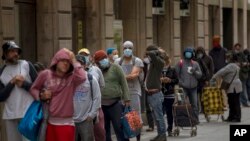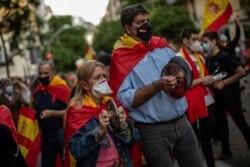Eduardo Sánchez is among the volunteers at a Red Cross food bank in Barcelona. Unfortunately, he is also one of a growing number of Spaniards who depend upon the charity for basic necessities.
The father of three lost his job at a catering company the day after Spain imposed a lockdown in March to try to contain the spread of the coronavirus epidemic. As the only breadwinner in the family, he was forced to ask for help from the Red Cross where he passes his days driving supplies around.
Sánchez, 47, is another casualty of the economic downturn caused by the pandemic, which has left seven million people - almost 30% of Spain's workforce - depending on state aid, according to government figures released in May.
Among those are people who have lost their jobs, been laid off temporarily or who are sick.
“It is pretty frustrating but what can you do? I am just hoping that when things get better, they will give me a call,” Sánchez told VOA as he loaded a van with fruit, meat and fish. “I am on the dole and get €1,200 ($1,317) per month. But that is €800 ($878) less than I did when I was working. With all the bills, we don't have enough. And the unemployment benefit will end in August.”
Economic hibernation
The Red Cross said since the lockdown plunged the country into economic hibernation, it has offered help to 1.6 million people – five times the number during the same period in 2019.
The Spanish Federation of Food Banks also reported a 30-40% rise in the number of requests for help since the start of the Covid-19 crisis, compared with the same period in 2019.
Spain is slowly easing its lockdown and workers are returning to their jobs, but the Bank of Spain has forecast that the longer-term damage to the economy will be severe.
Pablo Hernández de Cos, the bank's governor, said Spain's tourism-dependent economy could contract by 9.5-12.4% in 2020, but would bounce back next year, growing between 6.1-8.5%.
He said Spain was particularly vulnerable to the coronavirus pandemic as social distancing measures had a bigger impact on the tourism, hospitality transport and retail sectors, which account for 25% of GDP.
Protests
Amid impatience with the government's insistence on extending the lockdown until June 6, demonstrations have been held every night on the streets of Madrid, Barcelona and other cities across the country.
Protesters draped in Spanish flags and shouting Viva España! have demanded the resignation of the left-wing government.
“This government is destroying the economy. Their insistence on maintaining this lockdown is going to ruin the tourism sector and leave tens of thousands of people out of their jobs,” Guillermo Rocafort, a protester, told VOA in a telephone interview.
A confidential report by the Spanish Civil Guard, written before the demonstrations started, warned as the economic crisis deepens protests would be directed at key infrastructure points and political party headquarters.
The attacks would be carried out by those who had lost their jobs or been laid off, the police said.
Frustration at how the government is slowly lifting the lockdown is keenly felt in one of Spain's key industries: tourism.
The second most popular tourist destination in the world after France, Spain hopes to re-open for business by June, reviving a sector that accounts for 12.5% of GDP.
Arancha González Laya, the Spanish foreign minister, told the BBC, “We are hoping to get tourists back as soon as possible but we are also conscious that, when we welcome them, we want to provide the safest destination in Europe.”
Business leaders claim politicians, unions and local councils should drop extra red tape to help companies get back on their feet.
José Lombardero, who runs a series of restaurants in Barcelona and employs 150 people, said regulations imposed by the city council for opening up terraces outside establishments will cost struggling businesses thousands of extra dollars.
“It's really important that the local council, government, unions and business representatives bite the bullet and sit down and talk, and bravely, about how to defend business and with that jobs,” he told VOA.
“Everything has changed and the politicians have to catch up fast,” he said.
Barcelona city council did not respond to a request for a comment.
Miguel Otero, a senior analyst at the Real Elcano Institute think-tank in Madrid who advised the government on the easing of the lockdown, believes the crisis has changed Spanish attitude to the most vulnerable in society.
“There will be a big slump, big unemployment. But I think there might be certain consensuses around protecting more those who will be hit the most. Some years ago this might not have happened,” he told VOA in a telephone interview.











